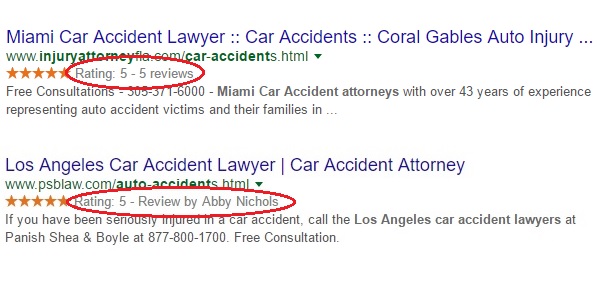If you are an attorney there is no doubt that you have seen one of your competitors that had some review stars showing up in Google search results. Criminal defense, bankruptcy, and personal injury lawyers use the review stars to take up more space in Google search and catch people’s eye. So. How do you get them for your site?
Google has never been clear on the topic
Search engines have displayed ratings on and off over the years for pages which have schema markup. Schema markup is additional code added to a web page which gives search engines information about a page. Instead of just seeing text, search engines can see more about a page, including reviews. There are many, many types of schema markup, including recipe markup and location markup. Of course today we are discussing review markup.
Review markup has always been used to mark up items, such as dishwashers or hot sauce. It has always been a pain to figure out how to mark up services. At some points in history, doing so was even a violation of the search engine’s rules.
Rich snippets, structured data, schema markup, oh my!
Structured data markup is content which can utilize Schema markup, such as a specific thing, such as a telephone number. Schema.org maintains the database of “things” which can be marked up, such as geographical locations, phone numbers, job descriptions, etc. Rich snippets are the end result, like what Google may display in search after it digests your structured data.
Confused? Yeah, I know. This is a structured data result for a car accident lawyer. That is what you want, I get it:
Schema markup can be done many ways
Adding to the confusion of marking up attorney pages is the fact that the code which is inserted comes in multiple languages. For marking up attorney reviews, structured data can be added in either JSON-LD code or Microdata.
There was a time when Microdata was king. Then later, Schema.org recommended everyone use JSON-LD, but Google only recognized Microdata. Google finally warmed up to JSON-LD throughout 2015. Thank God as it is way easier to use than Microdata.
Search Engine Rules
Now these can change but the big rule is that the review must be visible to the human eye (bear with me). Remember, this review markup was historically used for things like dishwashers, where humans could go in and review things at any time, just like they still can on Amazon’s website. You are adding this manually to your website; if you abuse the privilege it will be removed.
Microdata adds special code to existing text on a page. This sounds straightforward but can be a nightmare for your webmaster to get the text to behave and stay in one place on your website. The best place is often in the body/main content area of a web page, at the bottom. A review can be placed there, and then marked up with microdata code. Basically, it will usually look like normal text in your web browser, but behind the scenes it has special code.
JSON-LD is invisible. It is just code (it is a script). This is much better. But, some people abuse it. They just drop the code into their pages and that’s it. They still need to go back and add the review so that humans can see it (not just computers and search engines).
JSON-LD is a script, microdata marks up visual content. JSON-LD is loved by web designers, webmasters, and SEO people.
I would also link out to the review from your website. AVVO and Yelp reviews are easy to link to, Google reviews, however, are another story, especially since the separation of Google Plus and Google My Business.
Some attorney sites reject JSON-LD
 Justia, for example, is a very old CMS. Add a script of any type to the code of a Justia page and the page will kill itself and disappear. Thus, you can not simply drop JSON-LD code in to a Justia page and be done. You will have to use Microdata. I haven’t had a chance to try JSON-LD code on a FindLaw website as my FindLaw clients have all been moved to WordPress.
Justia, for example, is a very old CMS. Add a script of any type to the code of a Justia page and the page will kill itself and disappear. Thus, you can not simply drop JSON-LD code in to a Justia page and be done. You will have to use Microdata. I haven’t had a chance to try JSON-LD code on a FindLaw website as my FindLaw clients have all been moved to WordPress.
Different rich snippets in search in 2016
In 2016 we have 2 separate types of rich snippets being displayed in search. One method involves listing the number of reviews, the other involves listing a specific review.
Most people will never notice this, especially attorneys who simply want their star rating to display underneath their website in Google search results. But, here is a screenshot comparing the two anyways:

Screenshot of the two different types of review rich snippets attorneys can receive in Google search results as of 2016.
If you have a Justia website you will get the former when they configure microdata for you.
I prefer the latter, but again, it doesn’t really matter.
Configuring JSON-LD Schema review markup for attorneys
Ok, it is your lucky day; I am about to save you a bucket load of time. Below is the JSON-LD code you need. Forget all the markup generators out there, most of them suck. Copy what is below and stick it in your code. Be sure to change the date published, your firm name, client name, and review text.
Configuring Microdata Schema review markup for Attorneys
*Update January 2017: Google is removing Microdata from SERPs
Heh. Now begins the nightmare. Personally, I would go find 4 attorneys who are ranking and look at their code. You can choose to mark up all reviews, but again as long as you’re not on a restricted site, I would generate unique code for each page and pull reviews relevant to the service or area of practice on the page, such as car accidents, personal injury, DUI law, probate, etc. Here’s some code off of a Houston car accident lawyer’s site which worked as of October 20, 2016:
When will my stars show in search?
After configuring everything you’ll have to wait a while for the stars to show up in search. You can make sure the code validates with the testing tool below in the resources section.
Even after properly configured, the stars may or may not show up. There appears to be a little luck involved here. Additionally, Google is always tweaking the number of websites which get to display rich snippets in search results.
And, they can go away, too.
Additional resources
- Testing tool: When you or your web person configures your markup, test it at Google’s Structured Data Testing Tool.
- JSON-LD Markup for Local Businesses
- Update January 2017: Google is removing Microdata from SERPs
- Google “Pure Spam” Penalty Deindexes Sites March 6 2024 - March 12, 2024
- What Happened to ChicagoNow.com? - August 30, 2022
- The December 2021 Google Local Pack Algorithm Update - December 17, 2021





Len, I have been contacted by a firm that will give me free soft ware! to ask my clients to generate a review. The catch is that they are marketing themselves to provide all of the follow-up and to link the google review site to all of the other review sites, for $99.00 per month.
Is this monthly charge usual? As I was told there is NOT a monthly contract, I suppose I could try it and see whether it’s worth it. I am a one person, sole practitioner boutique law firm. I do not have a webmaster.
Thank you.
I would avoid that and any other unsolicited email.